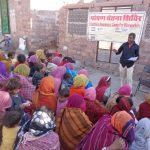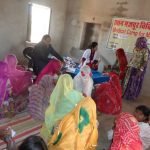Project: Combating silicosis and tuberculosis in stone mines
Location: Thar Desert, Jodhpur District, Rajasthan
Category: Education, Empowerment, and Health Care
Fighting Lung Diseases in Mine Workers
The state of Rajasthan is India’s largest sandstone provider. GRAVIS, a very well established NGO based in Rajasthan, has been actively involved in reducing the incidence of lung diseases in mine workers for many years. GRAVIS selected Soorsagar block in Jodhpur district for the work in 2017. The selected area includes hundreds of families who have been working in the mines for generations and are still mine workers today. The health of these miners and their families was the focus of GRAVIS’s research and intervention.
The activities of the project included:
- Training session on silicosis and tuberculosis for mine workers
- Medical camps
- Orientation session for mine owners
- Nutrition sessions
- Dialog with the government
Mine workers in the Thar Desert face extreme climatic conditions in addition to a hazardous work environment. Control and management of silica dust is not difficult, yet the mine owners do not even bother to implement the technique of wet drilling (which effectively reduces dust) or issue workers with protective gear (face masks, goggles, caps, gloves) and see that they get regular health checkups. All of these measures would result in improvements to the lives of miners.
There is no cure for silicosis, and the practice of precautionary measures is the only way to reduce the incidence of the disease. During the orientation session with the mine owners, GRAVIS encouraged humanitarian values in owners’ relationship to their workers. At the same time, GRAVIS instructed the owners in low-cost strategies—wet drilling, mandatory use of simple but effective safety equipment while on the job— for the benefit of the workers.
Medical camps were held regularly during the year. These help in early detection of silicosis and tuberculosis so that prompt treatment measures can be begun. During these camps, and in the meeting with the community of miners, GRAVIS provided info about government schemes to aid silicosis sufferers. In 2017, 168 silicosis patients were enrolled in these schemes. Government schemes for the welfare of mine workers’ wives and children were also discussed.
GRAVIS continued to face challenges. The progress report cites the difficulty of dealing with government officials. But the report also makes clear GRAVIS’s successes—800 mine workers were trained on silicosis and TB control, 779 were seen in medical camps, and over 700 visited nutrition sessions. GRAVIS intends to continue its work in the same format next year.
IDS Coordinator: Nila Vora
Project Manager: Dr. Prakash Tyagi
–2017 IDS annual report
GRAVIS, a very well established NGO based in Rajasthan, has been actively involved in reducing the incidence of lung diseases in mine workers for many years. With IDS support, GRAVIS implemented a lung health intervention project this year in a remote sandstone mining community of the Thar Desert in Rajasthan. The goals of the intervention were to raise the awareness of occupational lung diseases in mining communities and to reduce the incidence and prevalence of these diseases.

Rajasthan has a large population of workers involved in the mining industry. Mine workers in the Thar Desert face extreme climatic conditions in addition to a hazardous work environment. These workers are susceptible to occupational lung diseases like silicosis and tuberculosis. Silicosis is a severe dust-borne lung disease that scars the lungs and causes them to stiffen, hindering their expansion during breathing. The effects of silicosis are irreversible and fatal; there is no cure, so only palliative support can be provided to sufferers.
Tuberculosis, another potentially life-threatening lung disease, is curable and can be treated with medication. Mine workers with either one of these diseases are at great risk of developing the other; the combined effects of silicosis and tuberculosis result in significant suffering and premature deaths.
GRAVIS worked with the miners and mine owners this year to introduce techniques like wet drilling and to educate workers in preventive measures such as wearing masks, gloves, and shoes while working. GRAVIS also conducted medical examinations at the worksite for early detection of disease. Those identified as having significant health problems were sent for further medical management at nearby urban area hospitals. Nutrition camps were also held to instruct workers in the importance of an adequate diet and to distribute supplements to the community.
GRAVIS conducted orientation sessions for mine owners to make them aware of the problems of occupational lung disease and how it affects their workers’ quality of life. In addition, GRAVIS advocated for the mine workers at the government level to enforce safety practices in the mining industry.

With support from IDS this year, GRAVIS carried out eight medical camps, treated about 500 patients, trained and educated over 400 miners, distributed information about government schemes, provided information on better nutrition, and sensitized 63 mine owners to the importance of maintaining the health of their workforce.
IDS Coordinator: Nila Vora
Project Manager: Dr. Prakash Tyagi
–2016 IDS annual report

